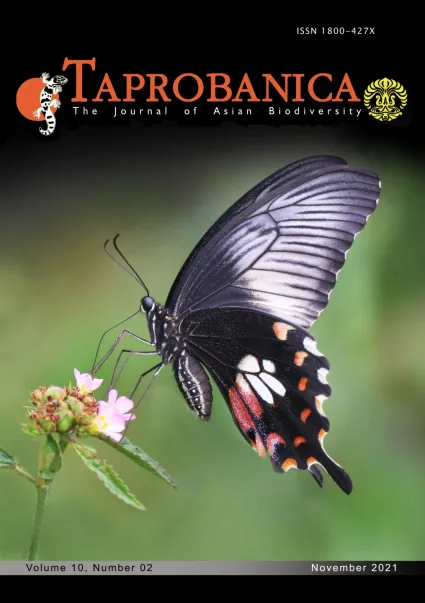

v10i2.262
Volume 10 | Number 2 | November 2021
Short Note
ISSN: 1800-427X (printed)
eISSN: 1800-427X (online)
DOI:10.47605/tapro.v10i2.262
Submitted date: 20 June 2021
Accepted date: 10 September 2021
Published date: 22 November 2021
Pp. 127, pl. 28.
Ophiophagy by banded krait (Bungarus fasciatus) exposed by a road kill
L. Biakzuala, Malsawmtluanga & H.T. Lalremsanga*
*E-mail: htlrsa@yahoo.co.in
Bungarus fasciatus (Schneider, 1801) is a nocturnal, large bodied krait species, widely distributed throughout South and Southeast Asia. It is found at a variety of habitats with relatively large home ranges. The ophiophagous diet of this venomous snake comprises a broad spectrum of prey items, even including its congener B. caeruleus. It also preys on skinks, fish, frogs, and eggs of snakes. On 16 June 2021, at 2105 h, a fresh road-kill of an adult male B. fasciatus (total length 1.46 m) was observed on a newly constructed tarmac road (width of road ~6 m) at New Khawlek (23°19'16.00"N, 92°38'36.95"E; alt. 715 m a.s.l.), Lunglei District, Mizoram, India. It seems the krait remained vulnerably exposed on the motorway while consuming a redtail pit-viper, Trimeresurus erythrurus (Cantor, 1839) (total length 48.8 cm), and was fatally run over while busy swallowing more than half of the length of its prey, most probably a few minutes prior to our arrival at the site.
Section Editor: Gernot Vogel
eISSN: 1800-427X (online)
DOI:10.47605/tapro.v10i2.262
Submitted date: 20 June 2021
Accepted date: 10 September 2021
Published date: 22 November 2021
Pp. 127, pl. 28.
Ophiophagy by banded krait (Bungarus fasciatus) exposed by a road kill
L. Biakzuala, Malsawmtluanga & H.T. Lalremsanga*
*E-mail: htlrsa@yahoo.co.in
Bungarus fasciatus (Schneider, 1801) is a nocturnal, large bodied krait species, widely distributed throughout South and Southeast Asia. It is found at a variety of habitats with relatively large home ranges. The ophiophagous diet of this venomous snake comprises a broad spectrum of prey items, even including its congener B. caeruleus. It also preys on skinks, fish, frogs, and eggs of snakes. On 16 June 2021, at 2105 h, a fresh road-kill of an adult male B. fasciatus (total length 1.46 m) was observed on a newly constructed tarmac road (width of road ~6 m) at New Khawlek (23°19'16.00"N, 92°38'36.95"E; alt. 715 m a.s.l.), Lunglei District, Mizoram, India. It seems the krait remained vulnerably exposed on the motorway while consuming a redtail pit-viper, Trimeresurus erythrurus (Cantor, 1839) (total length 48.8 cm), and was fatally run over while busy swallowing more than half of the length of its prey, most probably a few minutes prior to our arrival at the site.
Section Editor: Gernot Vogel
- List of Articles & Contents





